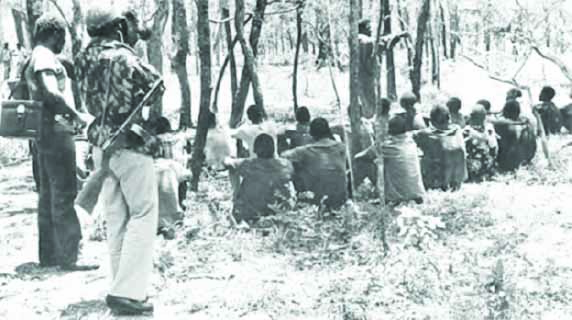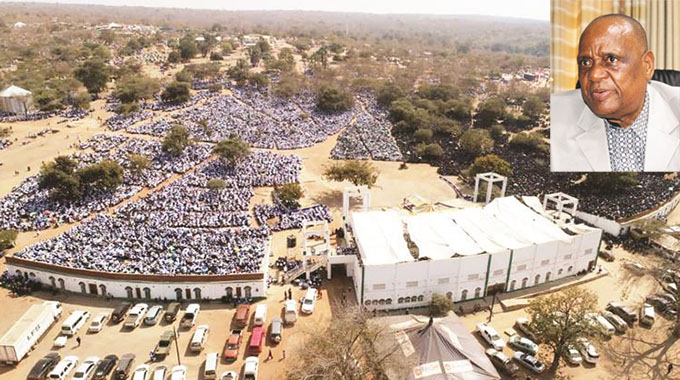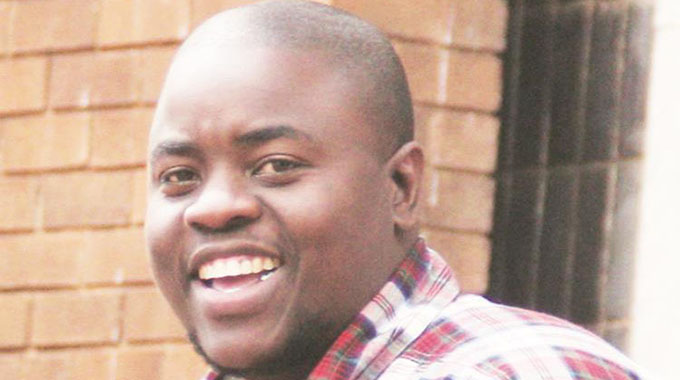Face-to-face with liberation heroes

Tanaka Chidora Literature Today
WHEN I arrived at Manga Secondary School to take up my post as a temporary English, History and Geography teacher, I expected to see a neatly arranged collection of blocks, beautiful rows of flower beds, a weather station somewhere near, and a school garden in which various forms of green jostled for attention. I was elated to take up this post and deliver to these children of resettled farmers what I thought were invaluable nuggets gleaned from my stint at university.
What I met filled me with mortification. A structure that resembled a classroom block sat forlornly in the midst of the fenced partition of an undulating stretch of grassland. This classroom block looked like a survivor of various forms of architectural struggles and amendments which were reflected in the variegated nature of its paint adornment. This classroom block housed four classrooms (Forms 1-4) and a staff office which was sandwiched at the centre of these classrooms. The staff office also housed the library, storeroom, HOD’s offices, head’s office, deputy head’s office, sportsmaster’s office and staff room.
Now, you will be forgiven the mistake of thinking that this room was an expansive affair. Far from it! It was something you just sneaked into and out of. During my year-long stint at this school, I managed to muster the tricks that would give this “sneaking” an air of respectability.
The “sneaking” needed some flourish and a certain facial disposition that many corporate guys may find hard to assemble on their faces. An old flag fluttered proudly (flags are usually proud) to the bidding of the wind. Each morning, the kids stood at military attention while Norman, the flagmaster, hoisted it up the gumtree pole with heroic panache.
I know at this point you are probably detecting some nostalgia in my tone. It is difficult to write about Manga without nostalgia, especially when you are writing in retrospect after encountering all the treachery the world confronts you with, treachery hidden behind plastic and fragile smiles.
It is also difficult to evade nostalgia, especially when the morning after your arrival at Manga Secondary School you hear a knock on the door of your room (which room is just an addendum of a makeshift structure respectably named the staff quarters) and open the door to find two old men standing outside, one holding three gigantic cobs and the other clutching a plastic bag whose contents look like groundnuts.
These two old men are Mdhara Kabvakacha and Mdhara Zarenga. As a way of introduction, the two old men informed me that after some reconnaissance (that’s actually the exact word they used), they had discovered that someone who was not from their vicinity had come to live among them and it was their duty to 1) vet the visitor and make sure he/she was not dangerous, and 2) welcome the visitor.
“However, since I am well-versed in the art of reconnaissance and counter-intelligence,” Kabvakacha continued, “I can tell that your intentions are sincere. Teacher, welcome to Manga.” After saying these words, both men extended their hands and handed over their contraband to me. I used the word “contraband” here because, as it later turned out, the groundnuts had been smuggled from Mbuya VaJerry’s groundnut field. Mbuya VaJerry was Mdhara Zarenga’s wife.
This was my first up-close-and-personal encounter with war veterans, outside literary fiction. Those who know me very well might want to correct me by pointing out that Mudhara Gaza of “Magamba Hostels” is a war veteran. Well, the thing about Mudhara Gaza is that no one really believes him anymore. So it is difficult to say I really had a “war veteran” experience while growing up in “Magamba Hostels”.
Up to the point of meeting Mdhara Zarenga and Mdhara Kabvakacha, my “war veteran” experience was mediated by Shimmer Chinodya in “Harvest of Thorns”; Alexander Kanengoni in “Echoing Silences”; Gonzo Musengezi in “Zvairwadza Vasara”; Vitalis Nyawaranda in “Mutunhu Une Mago” and other works of literature that thematised the war. Here were two war veterans, in flesh and blood, clandestinely smuggling some agricultural contraband to give a young, mortified temporary teacher a warm welcome.
The next day, at the local beerhall (this too a makeshift structure improvised from a tobacco barn), I met the two comrades. I was holding Ibbo Mandaza’s “Zimbabwe: The Political Economy of Transition, 1980-1986”. Mdhara Zarenga requested to see the book. He flipped through it, and then settled on the introductory chapter. After 15 minutes, he called me and said: “Teacher, this is a good book.” Kabvakacha released a humorous cackle and mischievously asked: “Vana Zarenga, makazogona kuverenga rini?” Those who knew the two took their customary positions as spectators of a fight that would never take place.
As I was to be told later by one of the village commentary experts, Zivanai, the two always built some hype around their fight, but that hype always ended in some anti-climax which involved the two hugging and slapping each other’s backs and taking generous swigs from the Black Label quart that they usually shared. They never fought because, according to Kabvakacha: “Why should Zarenga and I fight each other when we did all the fighting one can dream of in the war?”
Every time they spoke of the war, they took turns to narrate the events: the moments of fear, the moments of running endlessly, the moments of victory. But what left an indelible mark on my mind was when Zarenga told me how he hid in a pool of water away from the prying eyes of Smith’s soldiers for three solid days. “Only my eyes and nose were above the water. The rest of my body remained submerged in the water. For three days, dear Teacher. Three days!”
Then I saw it! I saw the horror of it all written on Mdhara Zarenga’s face. I saw the horrors of the war playing out at the end of Mdhara Zarenga’s eyes and I knew, I knew that even though I had never seen the war, there was something about these two old men that told it all! Then, as a way of detoxifying these toxic memory, Kabvakacha embarked on a war song that required a lot of jumping and swinging of legs and torsos. Suddenly, the mood in the beerhall dramatically changed into that of happiness.
I know it’s been a while since I last visited these two (I hope to do so soon), but what they taught me is that I cannot flippantly dismiss the sacrifices that the living and departed heroes and heroines of the liberation war made. For me, what these heroes and heroines did is what separates sacrifice from politics.










Comments